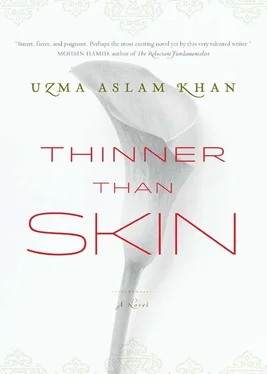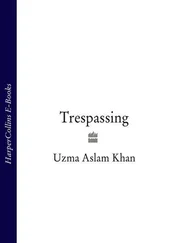But that day, after the woman whose son was fished out of the waterhole was slapped, Maryam did not really listen to them. Through the noise, she kept her poise, speaking the words she needed to speak, to whom she needed to speak them. She did not know from where the strength came. Perhaps from listening to the silence of the woman who had been slapped. She could feel the silence begin to consume her and thought it better that she scream her way to the other world, but when she whispered this into the woman’s ear the woman swooned, and Maryam could do no more than hold her, so hold her she did, through the moment she fell silent forever. She blew gently over her face. She brewed her a tea of sweet herbs that made her sleep. Nobody called Maryam a pagan wife, not that day, because she was the only one who could do more than talk and curse and swoon after being slapped into a comatose dream. They watched her, and despair became their glue, and glue became a tangle of arms in which to carry the woman to her hut. It untangled to lay the woman down, over her bed, and then Maryam could not remember where it went. She spent the day moving between the homes of the two families — the one whose boy had been found and the one whose boy had not — her own home — she returned Loi Tara to Namasha, who received her daughter with moderate reproach — and the store where her son Younis worked. On her way she noticed a ginger plant pushing its way into their allowed part of the forest from some disallowed part. At the store she pulled Younis into her arms. He was alive. She held him till he pushed her away. Afterward, she stole into her shrine and, for the first time since the man who played a double flute and told tales like a prophet and danced like a jinn first let her pull the honey from his fingers, she did not wait for any more signs. She did not wait for any more songs either. She made up her own. She sang to the woman whose silence was forever, a melody in which her boy would be with Kiran soon, in a valley of fairies and princes and roasted pistachios and flying horses. She sang to the woman whose silence was forever about heaven. Heaven was not a warm place but a world of ice, a world of placid lakes and two single peaks made of windows and doors called the Queen and the Nude. The Queen more or less stayed in the valley but the Nude had been to places far away, farther than the mountains even, and he would find those who had taken her child from her and caused a silence as deep as the lake to enter her womb. He would find them and do as he must and the woman should rest peacefully through it all and listen to this song of a heaven made of ice and fairies and roasted pistachios and flying horses, a heaven nestled between two peaks that watched over Kiran and this boy who would soon be with her. They would have good clothes to wear, Kiran and the boy. He might even convince her to braid her hair. He might even braid it for her. He would pay attention to the chime of her bangles. He would feed the goats they had lost down in this temporary world to the greed of fat Australian sheep. They would all be there, and the filly’s father too, the one who had leaped into a barbed wire fence and caused the filly’s mother to grow mean in this other world. The children would ride him together sometimes, over the two peaks, finding the surest footholds, stepping across the flattest stones, through rivers and glaciers and sweet mountain grass. And if they felt sleepy they would rest their heads against his velvet smooth back and their dreams would fill with a velvety smoothness. Their dreams would hold the best colors of their young imagination, which for Kiran would include every breathing shade of blue. Blue as a fairy’s wing, blue as a kingfisher’s tail, blue as the flower of the Jan-i-Adam.
So sang Maryam to the woman whose silence was forever as the talk in the valley grew and grew, alongside the boots and the pom-poms and the tanks and the appetites of those who had taken over their lives.
It was one o’clock in the morning when our driver dropped us off near Baltit Fort, to begin our ascent of Ultar Sar. He would not come with us, though he waited till we walked up the trail that twisted past the house where Farhana had spent yesterday. News of our plan had reached the village and many stood outside their homes in the cold to see us off, including the woman who’d led Farhana to the shaman. The girl and the goat were there too. My flashlight accidentally fell on her face and the face was deeply serious. I mumbled an apology for shining the light in her eyes and she replied by lifting her right hand and waving goodbye.
I tilted the flashlight away, looking for a magenta shirt, a green shalwar. But I’d seen no phantoms since entering this valley and, thankfully, I saw none now.
Before me walked Wes and Farhana. How different they seemed! Beside me, as always, Irfan. Behind us, the escort from Kaghan. I didn’t know why he, a merchant, would want to make this trek with us. But as it seemed to me that thus far I’d been asking all the wrong questions, I decided not to ask this one. If what he desired was to follow us all the way to the glacier, who was I to require an explanation?
I’d seen no armed convoys since entering this valley either. It was peaceful, quietly ceremonious, and freezing.
I was glad for the extra sweater beneath my windbreaker, the same windbreaker as on that night in San Francisco. Jack-eet, jack-eet , the man had said. I was glad he’d left me with my jack-eet. My shoes were sturdy, and Irfan had picked up a headlamp for me at the market in Karimabad. That’s where he’d spent his day — being practical, being Irfan. I’d never worn a headlamp on any of my night walks, and this one didn’t fit well. The straps were loose, despite all my adjustments. Nor could I get accustomed to the sensation of carrying a load at the center of my forehead, however illuminating the load might be. Besides, it was a red lens. It cast an oddly devious sheen on the pristine valley. Irfan wore his as easily as a bride wears a bindi. It even looked good on him.
As we reached the base of the mountain, I noticed a glow on each of Wes’s shins. Then I noticed Farhana’s, though hers were smaller. They’d come equipped, down to foothold lighting. “Did you think of that?” I asked Irfan. He shook his head. In silence, I recalled that on the shores of Lake Saiful Maluk, when we needed a tent, Irfan had provided his. Would Wes and Farhana now give up one light each, allowing all four of us more visibility? Perhaps we were both waiting to see if the offer was forthcoming.
When it was clear that it wasn’t, Irfan said, “Let’s keep each other in view. But maybe we should change partners. You stay with Wes.”
He must have thought I’d prefer this, despite how uncomfortable she made him. He didn’t know my plan was to pursue her on the mountain. For now, I agreed.
“You have water?” I asked, and he nodded.
“You have biscuits?” he asked, and I nodded.
“Five hours to the glacier, maximum. The sky’s clear.”
We both looked up at the serrated knives of Ultar rising before us. I couldn’t see too much sky.
“Dark,” he mumbled. Those were his last words to me before he stepped up onto a trail that was scratched through blocks of granite as large as a table for four. The rock edges were sharp. I put my head down and began the climb.
A few meters up I realized I was climbing on all fours. It was easier that way. I’d slipped my flashlight into my backpack and was relying solely on my headlamp, with peripheral aid from the two dots of yellowish light several feet ahead. The shins of Wes. I didn’t call out to him to slow down. I was alone with my thoughts, the adrenaline in my veins, and the weight on my back. My pack was heavy; inside lay more than water, biscuits, and a flashlight. I had to keep adjusting it, and adjusting the headlamp too, the latter mutating into an odd kind of mental strain. If I had a third eye, it would always give me a headache. The lens washed the wall rising before me in the same devious red hue as it had the road, and the world was like a rusted photo print. For a long time I was distracted by the eeriness of it. Color is location, I thought. And dislocation.
Читать дальше












